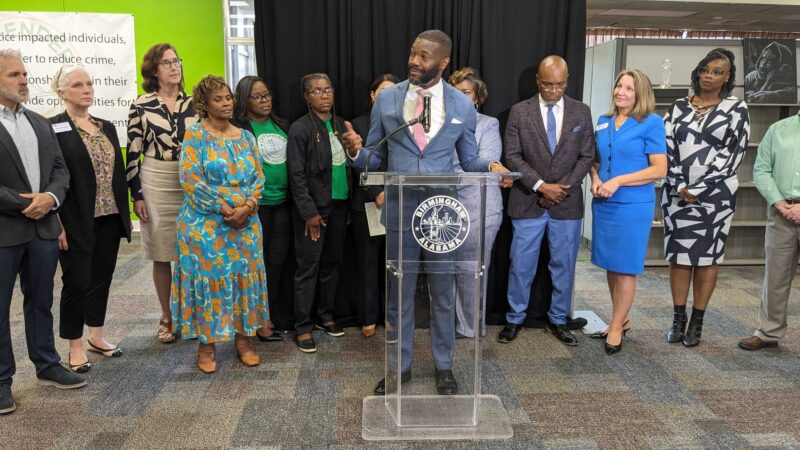Teach For America in Alabama
Everyone knows that schools report on student progress at regular intervals. The national service program Teach For America, or “TFA,” has now been in Alabama for one full school year. And as it gears up to send our state more than 50 new teachers, it makes
sense to ask, how are they doing? What grades would Alabama’s Teach For America teachers get on their report cards? Dan Carsen, who was a TFA teacher 15 years ago, asked around for the Southern Education Desk at WBHM:
Four girls harmonize on stage at the Indian Springs School in Pelham. It’s the end of a program called “Higher Achievement Summer
School.” The girls and 11 other high-schoolers from poor Black Belt counties spent most of June on the idyllic campus, far from home, taking
college prep courses and touring universities.
The whole experience was set up, funded, and taught by Teach For America teachers
working on their summer break for no pay.
Teach For America recruits top college graduates, gives them a crash course in education, and places them in districts
that face teacher shortages and other problems. The TFA “corps members,” as they’re called, sign a two-year commitment to teach in
the district, and they’re paid the normal starting salary.
“They go beyond the call of duty. They’re doing tutoring in the morning, they’re doing tutoring in the afternoon, not being paid.
They’re starting Boy Scouts, they’re starting Girls Scouts. They’re some of my better teachers in my school district.”
That’s Dr. Fred Primm, soon-to-be Superintendent of Bessemer City Schools, and former Superintendent of Sumter County Schools.
Sumter was one of the six counties that had TFA teachers last year. Primm says the plusses of TFA teachers include a proven ability
to lead and to learn quickly. He would give the program an “A.”
But can a top-notch undergraduate education and a record of academic achievement really compensate for a lack of classroom
experience and a short-term commitment?
Brad Fournier teaches at Sun Valley Elementary, an inner-city school in Birmingham. He’s a married father of two and something of
an overachiever himself, running a tournament-winning chess club on his own time and serving on various school committees. He says,
for TFA corps members, teaching is not the ultimate objective:
“It may be something nice to do, in the meantime. But these people didn’t go to school to teach. These are what we call ‘the best
and brightest’ who are given a nice little break, in between college and a career. And many of them do not stay in the classroom.
The best teachers are those who have been in the classroom for several years.”
Fournier resents the fact that in some districts, including Birmingham, regular teachers are getting pink slips while TFA teachers
are being hired. He also says that while some TFA teachers may have a short-term advantage, it’s hard for them to maintain:
“Why they may outperform first-year teachers who are traditionally educated comes from the fact that they are pouring everything
into it for two years. It’s easy to run a sprint. But if you run a sprint for an entire marathon, you’re talking burnout.”
The first national longitudinal study of TFA teachers found that just less than half stay in their districts longer than their
two-year commitment. TFA teachers are tossed into rough, unfamiliar waters, and while the vast majority swim, some do sink. Though
all 32 Alabama TFA teachers made it through their first year, five will not return for their second. That’s on par with retention
rates in low-income districts for regular first-year teachers.
Measuring the quality of education is notoriously difficult. This year’s testing data is just beginning to trickle in. And there
are other hard-to-quantify factors at play here. Superintendent Primm describes a different benefit of TFA, especially in isolated
Black Belt counties:
“Our students need to be exposed to people of other ethnicities. They also need to be exposed to people from other geographical
locations. Now you’re deprogramming people, and now you’re getting them to the point to think in a much broader sense in terms of
what the country actually looks like and the possibilities that are open to all students.”
Also hard to measure is the value of TFA alumni taking real knowledge of what goes on in America’s poorest schools with them as
they fan out into other fields.
TFA-Alabama Director J.W. Carpenter says his corp members have been supported by the communities
where they teach, and that’s key:
“If we’re going to close the achievement gap in Alabama, it’s going to take all of us. The future of Alabama over the next five,
10, 15 years is going to be made by the students that are currently in our classroom. And if we focus on getting them excellent
academically, and we focus on generating them to become leaders in their own communities in this state, I cannot wait to see what
Alabama is going to be like.”
Though there are critics with valid points, it seems that Alabama stakeholders are generally happy with Teach For America so far.
Its long-term success or failure here depends on the organization itself and on local teachers, administrators, community leaders,
parents, and students.
The initial sprint has been run, and apparently run pretty well, but in Alabama, the marathon is just beginning, and it may be just
too early to judge TFA’s chances of long-term success.
Pro-Palestinian demonstration draws counter-protest at University of Alabama
Students gathered demanding the school call for a permanent and immediate ceasefire and to push the school to sever ties with defense contractor Lockheed Martin.
A new Statehouse and related projects will cost about $400 million
The Alabama Legislative Council, a 20-member panel comprised of legislative leaders and their appointees, approved the construction of the new Statehouse last year. The panel was given an update on the project on Wednesday.
New pilot program will offer housing, resources to people leaving prison
The Birmingham Reentry Alliance will provide wrap around services to dozens of men and women adjusting to life after prison.
Alabama committee advances ban on LGBTQ+ pride flags in classrooms
The Senate Education Policy Committee voted 5-2 for the House-passed bill, putting the proposal in line for a possible final passage in the last four days of the legislative session.
A New Orleans garden paid hundreds of dollars in fees for a sewer that doesn’t exist
Galvez Garden owner Lissie Stewart has been fighting the New Orleans Sewerage and Water Board over inaccurate billing for years.
Alabama coal mine keeps digging after hundreds of fines and a fatal explosion
Following the death of a grandfather, Crimson Oak Grove Resources has left a community afraid for their homes and lives. An expert warns one resident may need to evacuate her home while she still can.







